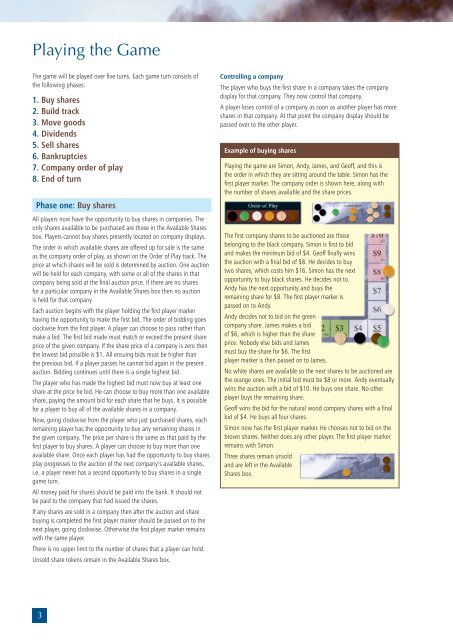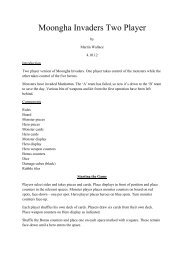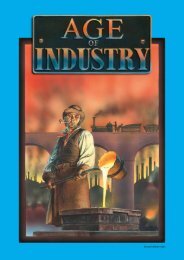Steam Barons Rules (PDF) - Treefrog Games
Steam Barons Rules (PDF) - Treefrog Games
Steam Barons Rules (PDF) - Treefrog Games
You also want an ePaper? Increase the reach of your titles
YUMPU automatically turns print PDFs into web optimized ePapers that Google loves.
Playing the Game<br />
The game will be played over five turns. Each game turn consists of<br />
the following phases:<br />
1. Buy shares<br />
2. Build track<br />
3. Move goods<br />
4. Dividends<br />
5. Sell shares<br />
6. Bankruptcies<br />
7. Company order of play<br />
8. End of turn<br />
Phase one: Buy shares<br />
All players now have the opportunity to buy shares in companies. The<br />
only shares available to be purchased are those in the Available Shares<br />
box. Players cannot buy shares presently located on company displays.<br />
The order in which available shares are offered up for sale is the same<br />
as the company order of play, as shown on the Order of Play track. The<br />
price at which shares will be sold is determined by auction. One auction<br />
will be held for each company, with some or all of the shares in that<br />
company being sold at the final auction price. If there are no shares<br />
for a particular company in the Available Shares box then no auction<br />
is held for that company.<br />
Each auction begins with the player holding the first player marker<br />
having the opportunity to make the first bid. The order of bidding goes<br />
clockwise from the first player. A player can choose to pass rather than<br />
make a bid. The first bid made must match or exceed the present share<br />
price of the given company. If the share price of a company is zero then<br />
the lowest bid possible is $1. All ensuing bids must be higher than<br />
the previous bid. If a player passes he cannot bid again in the present<br />
auction. Bidding continues until there is a single highest bid.<br />
The player who has made the highest bid must now buy at least one<br />
share at the price he bid. He can choose to buy more than one available<br />
share, paying the amount bid for each share that he buys. It is possible<br />
for a player to buy all of the available shares in a company.<br />
Now, going clockwise from the player who just purchased shares, each<br />
remaining player has the opportunity to buy any remaining shares in<br />
the given company. The price per share is the same as that paid by the<br />
first player to buy shares. A player can choose to buy more than one<br />
available share. Once each player has had the opportunity to buy shares<br />
play progresses to the auction of the next company’s available shares,<br />
i.e. a player never has a second opportunity to buy shares in a single<br />
game turn.<br />
All money paid for shares should be paid into the bank. It should not<br />
be paid to the company that had issued the shares.<br />
If any shares are sold in a company then after the auction and share<br />
buying is completed the first player marker should be passed on to the<br />
next player, going clockwise. Otherwise the first player marker remains<br />
with the same player.<br />
There is no upper limit to the number of shares that a player can hold.<br />
Unsold share tokens remain in the Available Shares box.<br />
Controlling a company<br />
The player who buys the first share in a company takes the company<br />
display for that company. They now control that company.<br />
A player loses control of a company as soon as another player has more<br />
shares in that company. At that point the company display should be<br />
passed over to the other player.<br />
Example of buying shares<br />
Playing the game are Simon, Andy, James, and Geoff, and this is<br />
the order in which they are sitting around the table. Simon has the<br />
first player marker. The company order is shown here, along with<br />
the number of shares available and the share prices.<br />
The first company shares to be auctioned are those<br />
belonging to the black company. Simon is first to bid<br />
and makes the minimum bid of $4. Geoff finally wins<br />
the auction with a final bid of $8. He decides to buy<br />
two shares, which costs him $16. Simon has the next<br />
opportunity to buy black shares. He decides not to.<br />
Andy has the next opportunity and buys the<br />
remaining share for $8. The first player marker is<br />
passed on to Andy.<br />
Andy decides not to bid on the green<br />
company share. James makes a bid<br />
of $6, which is higher than the share<br />
price. Nobody else bids and James<br />
must buy the share for $6. The first<br />
player marker is then passed on to James.<br />
No white shares are available so the next shares to be auctioned are<br />
the orange ones. The initial bid must be $8 or more. Andy eventually<br />
wins the auction with a bid of $10. He buys one share. No other<br />
player buys the remaining share.<br />
Geoff wins the bid for the natural wood company shares with a final<br />
bid of $4. He buys all four shares.<br />
Simon now has the first player marker. He chooses not to bid on the<br />
brown shares. Neither does any other player. The first player marker<br />
remains with Simon.<br />
Three shares remain unsold<br />
and are left in the Available<br />
Shares box.<br />
3











